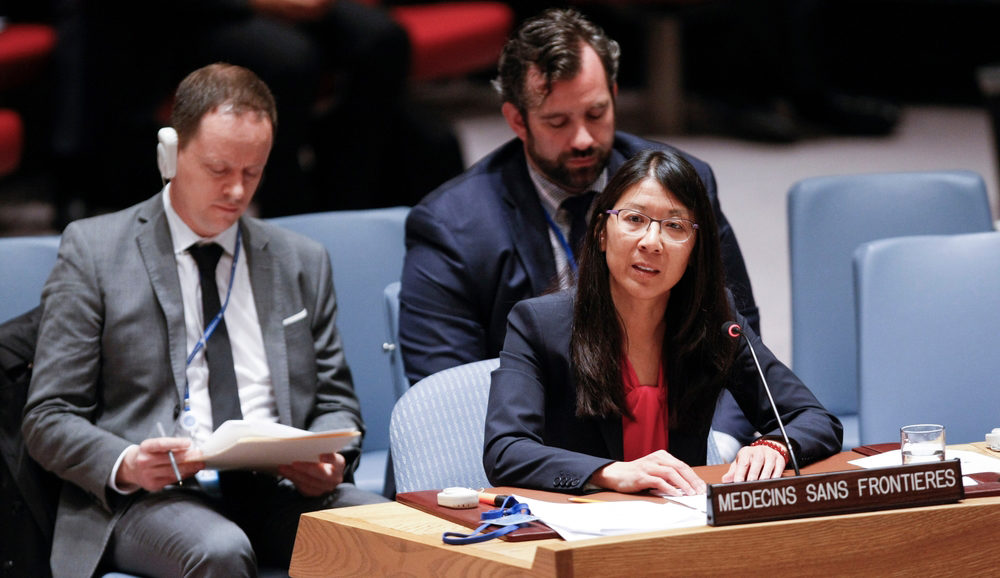After finishing my 1:2:1 podcast interview with Joanne Liu, MD, I asked if there was anything I missed. The former president of Doctors Without Borders thought for a second, and then was straightforward about what she wanted to say:
Nothing can beat the motivation of a parent to want a future for their children. Although there may be a dangerous sea to cross, or there might be a wall to go over somewhere, it is clear that there will never be a wall tall enough, or a sea dangerous enough, to prevent parents from having a dream for their children's future. That's unbeatable in terms of drive, of motivation. It verifies itself in every single culture. It's just universal. I see it in parents' eyes, wherever I work. Everywhere.
During her six-year tenure, Liu dealt with the Ebola crisis in West Africa and an airstrike by U.S. forces at the organization's medical facility in Kunduz, Afghanistan. I asked her about the situation there at the time of the strike in 2015.
Doctors Without Borders had started working in northeastern Afghanistan in 2011, she said, creating a health care hub that served more than 1 million people.
"I remember visiting that center a few months before we got attacked, and telling myself, 'This is such a gem,'" Liu said. "In that hospital, both sides of the conflict were coming to be taken care of, because it was a place of healing. It was a place of peace."
She told me how the airstrike unfolded on Oct. 3, 2015.
That night, in the middle of the night, there were five precise airstrikes on our central building, where we had the intensive care unit, the emergency room and the three operating theaters. Forty-two people died, including 14 of our staff and the head of the hospital, a friend of mine.
I think that attack is something that, for us... for me, remains a black day in my life. A day that I will always remember, 'What was I doing when I found out about it?' It's a day when for some reason, something broke in our, I would say, conviction that there were rules of war ... The no-go of a hospital had somehow evaporated."
Following the airstrike, Liu spoke before the U.N. Security Council -- an act, in itself, that was contentious within Doctors Without Borders.
"Some people were saying, 'By going there and speaking to the establishment, you become the establishment,'" Liu said. "'Therefore, it weakens the message.' Some others say, 'No. You go because at least you'll be under the spotlight. You're going to tell those people what is going on.'"
And what, I asked, was she thinking as she sat in front of members of the Security Council, some of whom are part of a coalition that bombed hospitals and medical facilities?
"For me, the extra personal thing that was very, very, very important: I was doing it for the team in the field," Liu said. The organization has 68,000 people with half of those working in conflict zones, she said.
Liu said it was important to her, as the spokesperson and leader of the organization, to represent the Doctors Without Borders members by confronting governance leadership.
I said if they are willing to live in war, I should be willing to go and confront ... those guys, and at least we will have pushed the issue at the highest level of security governance -- even if it doesn't give anything at the end of the day, which is more or less what happened. But at least we have tried.
When I asked Liu what she was most proud of during her tenure, she resisted the word "proud."
"I don't like the word proud," Liu said. "I don't think that you can take pride in a situation when people are so vulnerable and so much in need. I think it's a bit indecent."
She said she believes she and the organization have contributed to raising awareness of the challenges they face.
"For Ebola, we managed to get people paying attention and, somehow, some good things happened" in terms of global governance of public health emergencies, Liu said.
In early 2020, Liu was a fellow at Stanford, sponsored by the Center for Innovation in Global Health, the Freeman Spogli Institute for International Studies and the Humanities Center. She is now on a sabbatical, writing a book about her tenure at Doctors Without Borders.
Editor's note: Paul Costello's 1:2:1 interview with Joanne Liu was conducted before COVID-19 became a pandemic, so her comments in the podcast on the subject are brief.
Image by Paulo Filgueiras/MSF/Doctors Without Borders, courtesy of Joanne Liu




